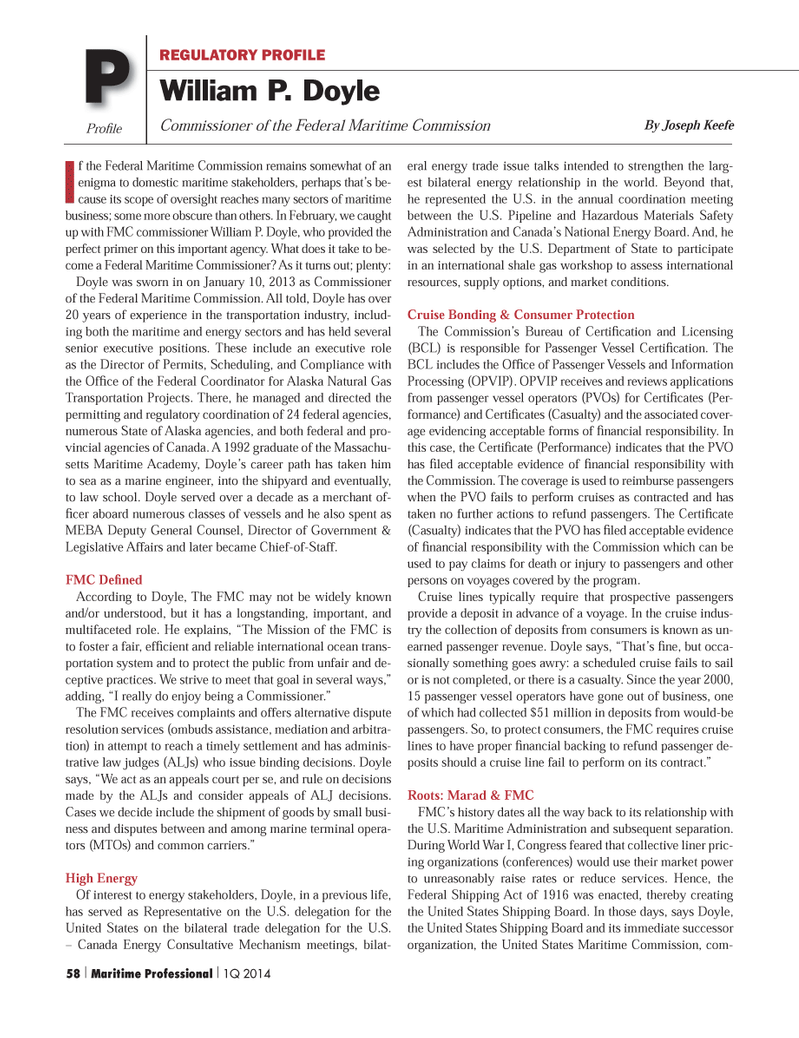
Page 58: of Maritime Logistics Professional Magazine (Q1 2014)
The Energy Edition: Exploration, Production & Transportation
Read this page in Pdf, Flash or Html5 edition of Q1 2014 Maritime Logistics Professional Magazine
I f the Federal Maritime Commission remains somewhat of an enigma to domestic maritime stakeholders, perhaps that’s be- cause its scope of oversight reaches many sectors of maritime business; some more obscure than others. In February, we caught up with FMC commissioner William P. Doyle, who provided the perfect primer on this important agency. What does it take to be- come a Federal Maritime Commissioner? As it turns out; plenty:
Doyle was sworn in on January 10, 2013 as Commissioner of the Federal Maritime Commission. All told, Doyle has over 20 years of experience in the transportation industry, includ- ing both the maritime and energy sectors and has held several senior executive positions. These include an executive role as the Director of Permits, Scheduling, and Compliance with the Offi ce of the Federal Coordinator for Alaska Natural Gas
Transportation Projects. There, he managed and directed the permitting and regulatory coordination of 24 federal agencies, numerous State of Alaska agencies, and both federal and pro- vincial agencies of Canada. A 1992 graduate of the Massachu- setts Maritime Academy, Doyle’s career path has taken him to sea as a marine engineer, into the shipyard and eventually, to law school. Doyle served over a decade as a merchant of- fi cer aboard numerous classes of vessels and he also spent as
MEBA Deputy General Counsel, Director of Government &
Legislative Affairs and later became Chief-of-Staff.
FMC Defi ned
According to Doyle, The FMC may not be widely known and/or understood, but it has a longstanding, important, and multifaceted role. He explains, “The Mission of the FMC is to foster a fair, effi cient and reliable international ocean trans- portation system and to protect the public from unfair and de- ceptive practices. We strive to meet that goal in several ways,” adding, “I really do enjoy being a Commissioner.”
The FMC receives complaints and offers alternative dispute resolution services (ombuds assistance, mediation and arbitra- tion) in attempt to reach a timely settlement and has adminis- trative law judges (ALJs) who issue binding decisions. Doyle says, “We act as an appeals court per se, and rule on decisions made by the ALJs and consider appeals of ALJ decisions.
Cases we decide include the shipment of goods by small busi- ness and disputes between and among marine terminal opera- tors (MTOs) and common carriers.”
High Energy
Of interest to energy stakeholders, Doyle, in a previous life, has served as Representative on the U.S. delegation for the
United States on the bilateral trade delegation for the U.S. – Canada Energy Consultative Mechanism meetings, bilat- eral energy trade issue talks intended to strengthen the larg- est bilateral energy relationship in the world. Beyond that, he represented the U.S. in the annual coordination meeting between the U.S. Pipeline and Hazardous Materials Safety
Administration and Canada’s National Energy Board. And, he was selected by the U.S. Department of State to participate in an international shale gas workshop to assess international resources, supply options, and market conditions.
Cruise Bonding & Consumer Protection
The Commission’s Bureau of Certifi cation and Licensing (BCL) is responsible for Passenger Vessel Certifi cation. The
BCL includes the Offi ce of Passenger Vessels and Information
Processing (OPVIP). OPVIP receives and reviews applications from passenger vessel operators (PVOs) for Certifi cates (Per- formance) and Certifi cates (Casualty) and the associated cover- age evidencing acceptable forms of fi nancial responsibility. In this case, the Certifi cate (Performance) indicates that the PVO has fi led acceptable evidence of fi nancial responsibility with the Commission. The coverage is used to reimburse passengers when the PVO fails to perform cruises as contracted and has taken no further actions to refund passengers. The Certifi cate (Casualty) indicates that the PVO has fi led acceptable evidence of fi nancial responsibility with the Commission which can be used to pay claims for death or injury to passengers and other persons on voyages covered by the program.
Cruise lines typically require that prospective passengers provide a deposit in advance of a voyage. In the cruise indus- try the collection of deposits from consumers is known as un- earned passenger revenue. Doyle says, “That’s fi ne, but occa- sionally something goes awry: a scheduled cruise fails to sail or is not completed, or there is a casualty. Since the year 2000, 15 passenger vessel operators have gone out of business, one of which had collected $51 million in deposits from would-be passengers. So, to protect consumers, the FMC requires cruise lines to have proper fi nancial backing to refund passenger de- posits should a cruise line fail to perform on its contract.”
Roots: Marad & FMC
FMC’s history dates all the way back to its relationship with the U.S. Maritime Administration and subsequent separation.
During World War I, Congress feared that collective liner pric- ing organizations (conferences) would use their market power to unreasonably raise rates or reduce services. Hence, the
Federal Shipping Act of 1916 was enacted, thereby creating the United States Shipping Board. In those days, says Doyle, the United States Shipping Board and its immediate successor organization, the United States Maritime Commission, com-
Profi le
REGULATORY PROFILE
William P. Doyle
P
By Joseph Keefe
Commissioner of the Federal Maritime Commission 58 | Maritime Professional | 1Q 2014
MP Q1 2014 50-63.indd 58 2/27/2014 11:48:02 AM

 57
57

 59
59
